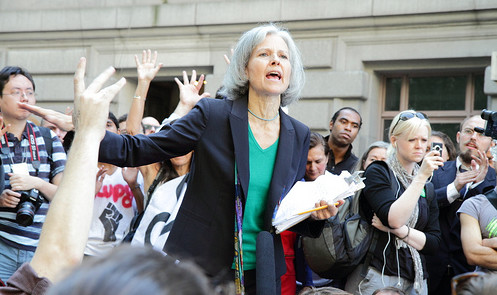We’ve already bemoaned the superficiality and exclusiveness of American presidential debates, but most American voters probably think that it doesn’t matter anymore. Election Day is just two weeks away and last night’s debate was the last time Barack Obama and Mitt Romney will square off on the issues (at least, for this campaign cycle).
But debate season isn’t actually over. In fact, there’s a presidential debate happening tonight—and I can say with some confidence that it will be the best one yet.
Of the few who know about tonight’s third-party debate, most probably see it as a waste of time. None of the candidates involved—Libertarian Party candidate Gary Johnson, Green Party candidate Jill Stein (full disclosure: I am an intern for the Stein campaign), Constitution Party candidate Virgil Goode, and Justice Party candidate Rocky Anderson— has a realistic chance of winning the White House (Obama and Romney were invited, but it’s a safe bet they won’t show up). That Larry King will serve as moderator and that the debate will not be carried on any major network or cable channels have not helped its ethos.
But that does not mean the debate is not a worthwhile endeavor. On the contrary—the participating candidates each have serious platforms and agendas, and together they will discuss a vast range of issues far beyond the relatively small ideological ground that separates Obama and Romney.
Take Gary Johnson, whose standing in national polls has reached as high as six percent. His Libertarian platform includes such ideas as legalizing marijuana and treating hard drug abuse as a medical condition, abolishing the Internal Revenue Service and the Department of Education, and “ardent[ly] support[ing] 2nd amendment rights.” These are not the kind of ideas one hears from the major parties.
Jill Stein’s proposed “Green New Deal” is also far beyond the scope of the Democratic and Republican Parties’ platforms. Her ambitious agenda includes pursuing full employment, implementing nationwide single-payer health care and free tuition for public undergraduate institutions, stepping up investment for environmentally friendly energy and technology, restoring the Glass-Steagall Act, and increasing voter protections. Much of this may resonate with liberals who have resigned themselves to voting for Obama.
Meanwhile, Virgil Goode may be closer to some conservatives’ image of an candidate than Romney is. Goode describes himself as “Consistently Pro-life”, opposes international trade agreements and any sort of same-sex unions, and supports making English the national language and using troops to protect the U.S.-Mexican border. Goode is clearly to the right of Romney and could hold some appeal to Tea Partiers who would have preferred a more conservative Republican nominee.
Finally, Rocky Anderson’s Justice Party platform is largely focused on fighting economic inequality: he suggests raising the top incremental tax rate to as high as 90 percent, while increasing the minimum wage to “no less than $10.00 an hour.” Anderson also proposes making water preservation a top priority, ending sanctions against Iran, and to end “unquestioning support for Israeli government actions.”
None of these candidates will be the next leader of the free world, so to the extent that a debate a chance to challenge those in power this is not a real opportunity. But if a debate is a chance to exchange ideas, challenge policies, and offer alternatives, then this event should be infinitely more germaine than watching Obama and Romney fight tooth and nail over a disproportionately small slice of the political spectrum.
Four candidates will be on the stage tonight when the cameras light up on C-SPAN and Al Jazeera English and RT America. All four of them are on enough state ballots to have a mathematical chance of winning 270 electoral votes, and all four of them have serious platforms and proposals that deserve the American voters’ consideration. You’d do well to tune in.

RT @BrownBPR: Why the Third-Party Presidential Debate is Worth Watching http://t.co/pBvHMzZW by @LewsOnFirst
Word.